Zimbabwe’s population is now estimated at about 12.3 million after taking into account the effects of excess mortality due to AIDS and poverty.
To say that the forthcoming elections represent a defining moment in the history of post-colonial Zimbabwe would be an understatement.
The combined elections will give the eligible and registered voters an opportunity to decide at four levels how Zimbabwe should be governed in the next five years.
The first level is the Presidential election in which citizens have to make a choice between the four candidates that have been successfully nominated.
Two of the candidates, President Robert Mugabe and Morgan Tsvangirai, were the two dominant players during the last presidential election held in 2002. The other two are Dr Simba Makoni and Mr Langton Towungana.
To the extent that Mugabe who has monopolised the political space since independence is also a candidate, it is important now that the choices are known for Zimbabweans to think seriously about the future of the country.
The political space in Zimbabwe was dominated by ZANU and ZAPU during the first seven years of independence and thereafter through to 1999, the space was dominated by ZANU-PF.
However, during the last eight years, Mugabe and Tsvangirai have dominated the political space.
Both ZANU-PF and MDC representatives were elected to Parliament during the 2000 and 2005 elections and the successful candidates have managed to co-exist under the same House of Assembly.
Consequently, they share the burden of governance as they have been involved in the day to day legislative agenda, which recently resulted in them agreeing to Constitutional Amendment number 18.
Prior to the emergence of the MDC as a political actor, the civic society organisations (CSO) from which the founding members of the party were drawn were agitating for a new constitution.
The National Constitutional Assembly (NCA) was one such institution advocating for a people driven constitution arguing that the parliament of Zimbabwe could not be trusted to deliver a democratic constitution.
Understandably, the NCA then rejected the CA 18 agreed to by both ZANU- PF and the two MDC formations.
At the core of the argument for constitutional reform debate, was the issue of process power and the role of the President particularly given the generally held view that Mugabe had manipulated ZANU-PF and the people of Zimbabwe into agreeing through their parliamentary representatives to amend the Lancaster House Constitution in a manner that has created an Imperial Presidency in which he has been able to run the country as if it was a kingdom.
The quest for a new constitutional order was successfully thwarted through the use of a Constitution Commission that was mandated to draft a new constitution.
The credibility test for the draft constitution was primarily the manner in which the office of the President was treated.
When the constitution was sold to the Zimbabwean public, it was naturally rejected by even the most ardent advocates of the new constitution because it failed to deal decisively with the incumbent President.I am only bringing this historical record in order to put my thoughts, on the points that the registered voters participating in the forthcoming elections have to think seriously about, into some context.
The attempt to remove Mugabe through constitutional reforms failed so as the attempt to remove him through elections as well as subsequently through ZANU-PF.
The presence of Mugabe’s name alone on the political menu raises its own issues about the credibility and transparency of the forthcoming elections.
Mugabe has credited his government of holding free, frequent and fair elections in which his party has always ‘won’.
As American author and historian, Henry Brooks Adams, said over a hundred years ago: “No man, however, strong can serve ten years as school master, priest, or senator, and remain fit for anything else,” it has been observed that Mugabe notwithstanding the fact that he may not know what to do to lift Zimbabwe up again fits into the category of persons who look to politics as a career rather than as a service platform.
A dilemma Zimbabwe’s opposition is also faced with; imagine the fate of many after say they lose their parliamentary seats in the March elections? Or what would become of Tsvangirai should he cease to be leader of the opposition?
The post-election intentions of Mugabe are not known but it has been speculated that he will relinquish power to a successor who would then have to be elected by parliament.
However, there are no guarantees and people are genuinely sceptical and cynical about the future to the extent that they have surrendered their future to only four men.
It is now too late for Zimbabweans to think of a President beyond the four men that have qualified as candidates. If President Mugabe were to win, the other three contenders will predictably challenge the results.
It is generally agreed that Mugabe does not offer anything new but if he does win, very few of his critics outside Zimbabwe will accept the results, prolonging the country’s pariah status.
The country is on its knees and yet the conversations at this late hour between Zimbabweans and among the three competitors for the top post excluding Mugabe suggests that some Zimbabweans are not ready to break with the past.
Given the gravity of the economic situation, one would have expected Tsvangirai, Makoni and Towungana to share a common vision for Zimbabwe and a consensus on what the defining hour should deliver.
While Makoni and Tsvangirai may disagree about the context of change they ought to agree that they are brothers in prosecuting the struggle to usher Zimbabwe into a new era.
It cannot be said that it is not healthy for Makoni to have entered the Presidential race not only because it has allowed people to expand the menu of choices beyond the two bitter enemies, Mugabe and Tsvangirai.
Indeed, the entry of Makoni has given voters an opportunity to pronounce their opinion on whether they wish to continue to be spectators and victims while the stalemate continues.
It is not clear whether Mugabe would accept Tsvangirai’s victory and vice versa. A new dawn is urgently required in Zimbabwean politics and Makoni may emerge to be the only available option.
One cannot accept a proposition that the entry of Makoni has denied anyone a right to participate in the elections given that the same old culprits are still on the ballot paper.
It is expected that Makoni’s participation will help energise the Zimbabwean electorate to participate rather than fall victim to the MDC strategy of participating in a race while openly acknowledging that the vote will be stolen.
This will have had the effect of discouraging voters from participating in the elections if Makoni had not entered the race.
A Zanu PF culture runs through the veins of even the most ardent critics of Mugabe’s policies.
Although I hold no brief for Makoni, I think that it would be undemocratic for even any of his competitors to characterise him as a surrogate of someone else when it now takes courage in an atmosphere of fear for anyone to offer his name as an independent.
I am not sure whether the critics of Makoni’s eleventh hour entry into the race would have been satisfied if the contest was between Mugabe and Tsvangirai only.
Strangely, many of them had dismissed this election as having been won by the incumbent Mugabe.
One Dr Lovemore Madhuku even went as far as to give an exclusive interview to the state run Herald that the opposition would be walloped in this election, a position he reiterated at a public meeting in Harare and was supported by the majority there.
It may be the case that many of the CSOs are encouraging Tsvangirai to participate fully convinced that he will lose so that they can extend their lives.
The NGO sector in Zimbabwe would rather have the stalemate continue and the elections inclusive because of the inherent financial benefits to the actors.
Ever since I pronounced my personal opinion on what kind of change I would like to see in Zimbabwe, I have been encouraged by my critics who have proceeded to allege that my support for Makoni was motivated by an underlying ZANU-PF agenda.
It did not surprise me to receive mixed messages about Makoni because it demonstrates that Zimbabweans are thinking about the future of the country.
Some have accepted that the future will not be complete if their preferred candidate does not win the election ignoring that what is at stake is not the fate of the four candidates but the country.
However, one needs to unpack the logic behind my being defined as ZANU-PF or Makoni for that matter, I want to posit here that ZANU-PF is not only an institution but a culture that permeates every aspect of our society, including the home, the church and the so called alternative politics.
Zimbabwean national politics is so diluted that many in the opposition camp including parliamentarians, for instance, are funded and sustained in their livelihoods by the RBZ and other state institutions, militating against any argument that may be advanced that anyone in the MDC is fresh faced and pure as it may have been at its formation eight years ago.
If Zimbabwe was a person, what would he/she say about the four candidates? Anyone who cares about the future of the country is compelled to think deeply about legacy issues.
The people privileged to vote in this defining election have to think beyond the confines of their own personal preferences but for all the millions in the Diaspora as well as future generations who will no doubt look back and ask the right questions.
Both Mugabe and Tsvangirai have been at each other’s throat for the past eight years and the country has continued to deteriorate under their watch.
They have both claimed to be victims with Mugabe alleging that Tsvangirai is nothing but an agent of third parties while Tsvangirai maintains that he is the de facto President of Zimbabwe on the back of a widely held view that he won the 2002 elections.
Tsvangirai disputes that the MDC is a puppet of the West and yet ironically, he now wants to argue that Makoni is not a principal in his own right who genuinely believes like him that Zimbabwe’s brighter day is yet to come and he has a stake in it.
There is a classic Zimbabwean disease that seems to have afflicted many to see beyond what is before them. Zimbabweans have to choose from the four men who are the political beauty pageants.
Like beauty queens the judges are the registered voters who have to make the choice based on their subjective evaluation of what each candidate brings to the table.
What does Mugabe bring to the table? This question is equally applicable to the other three contestants.
However, instead of waiting for the contestants to promise what they cannot deliver it is important for everyone interested in the future of the country to pose and think about what they want to see and work constructively in the remaining days to make sure that they are the change they want to see.
It is naïve for anyone concerned about the future of Zimbabwe to think that it is someone else’s responsibility to bring the change they want to see. Mugabe has the African continent as well as the majority of the developing countries while Tsvangirai has enjoyed the support of the West.
Over the last eight years, I have not seen any major drive to increase MDC party membership let alone to get people to register as voters.
It has been reported that following Makoni’s announcement to enter the race, the registration of voters increased suggesting that Zimbabweans do respond to changes in the choices available.
Notwithstanding, excitement and vibrant debate has been generated as a direct consequence of Makoni’s entry into the Presidential race in a manner that has dramatically transformed an increasingly apathetic population.
What the above seems to suggest is that Zimbabweans in general do not see value in participating in the affairs of their country through political organisations.
Many who support either Mugabe or Tsvangirai are not even members of ZANU-PF or the MDC, respectively.
If citizens have surrendered their future to political actors then the change they expect to see may not necessarily be what they want to see irrespective of who is elected.
If ZANU-PF, MDC and other Zimbabwean political organisations unlike religious institutions have failed to capture the imagination of citizens then the problem that Zimbabwe faces may be more fundamental.
I am not convinced that the people who have been nominated to represent MDC and ZANU-PF necessarily share a common vision with their leaders.
Many are however trapped in this partisan politics and it becomes clear that many in ZANU-PF actually may be against Mugabe’s candidature while those in the Tsvangirai formation may not necessarily be at one with him.
Not discounting the disillusioned in both formations that claim to have been elbowed out of the race for political reasons and are now standing as independent candidates.
Assuming I am correct in suggesting that the political labels that people put on Makoni, Mugabe and Tsvangirai have no real meaning because in real life it is difficult to locate a person who is ZANU-PF or MDC but what is more realistic is that there may be a convergence of thought between Makoni/Tsvangirai/Towungana about the need for change.
For Mugabe the change that he wants to see would allow him to be President and the same applies to his competitors. Zimbabweans would then need to makes choices discounting the political labels because they ultimately may have no bearing in the manner in which the government will operate.
I am also not convinced that ZANU-PF members are satisfied about the manner in which Mugabe’s government has conducted its affairs, thus the noticeable fears within the party ranks of Makoni’s challenge to Mugabe.
It would not make sense to believe that the dismal economic performance and the lack of political and economic direction that Zimbabweans have been subjected to have only been transmitted on partisan grounds.
I should like to believe that if there is no electricity or water in an area, one would not see only ZANU-PF houses being privileged with supplies. The problems affect all and the current government has to shoulder the responsibility.
Outside the contestations for political office, there appears to be no life in many of the political organisations in Zimbabwe suggesting that the real agenda is to seize the state power and not necessarily to advance any national interest.
If it is national interest that motivates people to seek political office then it should not matter who is ZANU-PF or MDC because these are mere labels seeking to divide and not unite people.
Makoni has rightly chosen to wear no political label. I believe that it is important that Zimbabweans rise above the cheap politics of defining and characterising others as currency for advancing their political careers.
What do people of Zimbabwe really expect from their government? Who really should own the government of Zimbabwe?
If citizens are ready to reclaim their heritage then they have to think beyond the labels because whoever becomes President has to be accountable to the people of Zimbabwe and not to the parties that select them.
Only two candidates for the Presidency will not have the baggage of political organisations that are faction ridden, with questionable democratic credentials and maybe there is a chance that the people of Zimbabwe will come to a realisation that they are the true owners of the republic and not ZANU-PF or MDC.
Consequently, Zimbabweans in choosing their leader in the next election will judge both the MDC and ZANU-PF on performance over the past eight years for the former and the past 28 years for the latter.
The MDC cannot continue to plead innocence and play victim when it has been involved in the process of governance together with ZANU-PF, it also has to shoulder responsibility for the disillusionment in its ranks arising from a myriad of problematic issues that are a matter of public record.
To put it crudely, MDC legislators have enjoyed perks of being in parliament just as ZANU-PF MP’s have, they have equally contributed to the legislative agenda.
To make matters worse, it is significant to note that the reason that caused the two MDC factions to split appears to have been forgotten as both formations have fielded candidates for the Senate.
And so one can safely argue that Makoni’s rise and popularity is as much a result of ZANU-PF’s inability to deliver positive change to its members as much as the MDC’s similar inability to deliver to its own members.
ZANU-PF and MDC like any political parties are nothing but associations of people who may share a common purpose but it does not mean that the institutions own the members.
Zimbabwe needs to turn a new leaf and invest in creating a new environment, with a progressive political culture that can operate above the partisan one that sections of the country have now come to accept as normal.The person elected to be President of the country must discharge his responsibilities in the national interest.
Questions have been raised whether an independent Presidential candidate will have any chance of winning if he does not have a political party behind him forgetting that all that the citizens will be asked to do is to elect one of four men.
Makoni is contesting in one big constituency called Zimbabwe, by the look of things he appears to appeal to a diverse group of Zimbabweans regardless of political affiliation.
Thus the fears and the vitriolic attacks from hardliners in both the MDC and ZANU-PF, begs the question of what they fear if they have a satisfied support base.
The constitution of Zimbabwe does not require a President to belong to a political party.
What it will mean if any of the two independent candidates wins the Presidential election, is he will have to appoint a candidate from the pool of successful parliamentarians.
Given the configuration of the players in the various elections, it is evident that only an independent President has any prospect of creating a government with a cabinet drawn from the various political parties.
If the objective of Zimbabweans is to move away from largely despotic partisan politics then it occurs to me that this can only be achieved by an independent President.
I am not convinced that either Mugabe or Tsvangirai would have any appetite for embracing MPs from either party given the attitude already in evidence against Makoni’s candidature, including the inability of the two MDC formations to agree to a coalition before the elections.
My observation is that the real injury that Zimbabweans feel is at the Presidential level and for people to be convinced that there is change they can believe in there must be a new President.
It is not too late for Tsvangirai and Makoni to come up with a joint election winning strategy for the nation’s sake.
If that is the position, then the onus is on both Tsvangirai and Makoni to ensure that they communicate to their supporters clearly that they vote for whomever you may wish at the local, parliamentary and senatorial levels but vote against Mugabe.
This is the ideal situation which unfortunately the polarised political ground no longer allows.
Given the already publicised candidates lists, it is already confusing the long suffering people of Zimbabwe when the opposition seem to be failing to identify who is on which side.
I would have thought that both Tsvangirai and Makoni would target the Presidency using the infrastructure available to make the voters know what is at stake.
It is to the favour of the already fractured MDC as much as it is to Makoni that a combined election strategy that wins against the incumbent President Mugabe is adopted.
Future generations will judge both Makoni and Tsvangirai on the basis of their actions during this hour of need and not whether they were ever active members of ZANU-PF before.
LINK!!!
* Mutumwa Mawere is a Zimbabwean-born South African businessman
TSVANGIRAI DOES NOT RULE OUT WORKING WITH MAKONI!
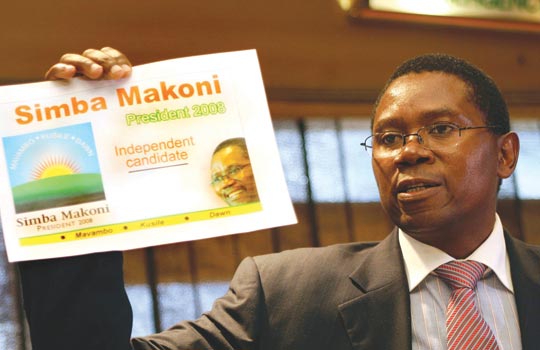
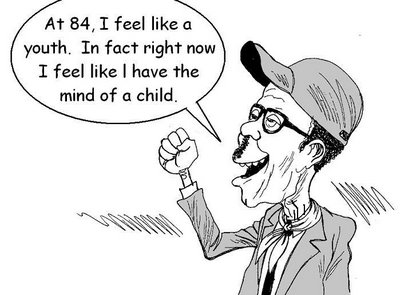
Subscribe to:
Post Comments (Atom)




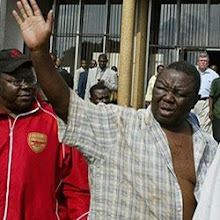
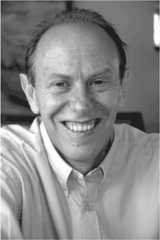
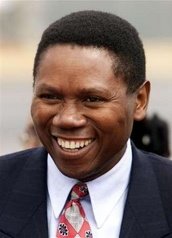

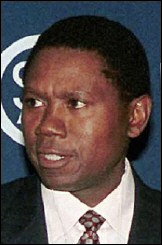


No comments:
Post a Comment